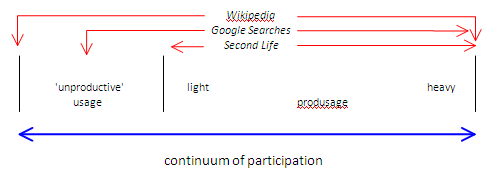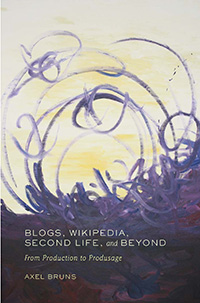You are here
From User to Produser: The Continuum of Participation
The other day, I received a very insightful question from somebody reading Blogs, Wikipedia, Second Life, and Beyond: From Production to Produsage - pointing to a line in the book which states that
participation in these social spaces a continuum stretching evenly from active content creation by lead users ... to the mere use of content by users who perhaps do not even consider themselves as members of the community (18)
and asking, in essence, where mere usage ends and real produsage begins. In particular, what about the differences between spaces such as Second Life, where usage and content creation are necessarily part of the same process, and Wikipedia, where content creation and usage can remain separate, but individual users are free to move between the two? I thought it might be worth posting my reply here, to further explore this issue.
The Continuum of Participation
In the first place, let's explore that idea of a continuum a little more. I would suggest that participation on a site like Wikipedia stretches from simple browsing to heavy involvement in content creation and community management, but clearly not all forms of such participation can be considered to be produsage as I define it. Produsage, instead, begins within that continuum some way beyond mere browsing, as soon as such browsing is generating content (i.e. data or metadata). So, in other words, I suggest that every contribution by a produser is creative (or rather, that is my definition of produsage), but it remains possible on some sites to be a mere (for want of a better word, 'unproductive') user as well.
By way of a quick'n'dirty graph:

In other words, using a few examples:
-
in Second Life, it's impossible to be a mere user - anything you do there ultimately creates content which affects other users' experience of the space;
-
in Google searches, it's (as near as makes no difference) impossible to be a mere user - any search, any click on a search result (and certainly any use of the promote/delete/comment functions they've recently rolled out for search results) creates content which affects other users' search results
-
-
(as a corollary, we could say almost the same for the Web itself, to the extent that it is visible to Google and that Google tracks our uses of it: to use the Web as a mere user, without affecting Google's search results, is possible only if you switch off the Google toolbar, block Google's site analysis scripts, don't have a Website/profile/online presence of your own whose content and incoming/outgoing links Google may add to its index, and so on - being invisible to Google is now very difficult, in other words (for better or for worse), and unless you are invisible, anything you do online will affect Google's search results in a very small way);
-
-
on Wikipedia, on the other hand, it does remain possible for the most part to be a mere user, not having your own profile, and only browsing the space without adding any content - at least, that is, until and unless Wikipedia begins tracking usage patterns in order to improve its search results and add automatic cross-referencing (e.g. Amazon-style - users who looked at "quantum physics" also looked at "Star Trek"...); at that point, even anonymous browsing again turns into produsage (as it does on the Web, in Amazon, etc.) as it generates content which affects the experience of other Wikipedia users (and frankly, I'd be surprised if MediaWiki developers aren't already thinking about this possibility).
Squeezing Out Non-Produsage?
The main point I want to stress, obviously, is that we're talking here about a continuum of more or less involved forms of produsage and usage - as I say in the page 18 quote, from lead produsers through to very light produsers (whose produsage contribution is accidental, and even unknown to them - again, people using Google search results are a good example here), and (beyond produsage itself) to simple usage.
But, noting what I said about Google above, that's not the end of it. That part of the continuum which remains purely ('unproductive') usage, not produsage, is being squeezed out more and more. With Google and other behavioural tracking systems aiming to harness even the patterns of such simple usage, that section on the continuum is being rapidly diminished; in other words, through such systems, even simple usage is turned perforce into a contribution to the produsage process, whether those whose patterns are being observed are aware of this, and consent to it, or not.

Whether that's a bad thing or not is in the eye of the beholder, I guess - on the one hand, the more comprehensively these behavioural patterns are tracked and analysed, the better (perhaps) the results; on the other hand, the more comprehensively they are tracked, the more comprehensively we are tracked, potentially undermining our privacy and generating personal profiles which may, at some point, be used against us...
- Snurb's blog
- Log in to post comments
- 11435 reads
 Printer-friendly version
Printer-friendly version


